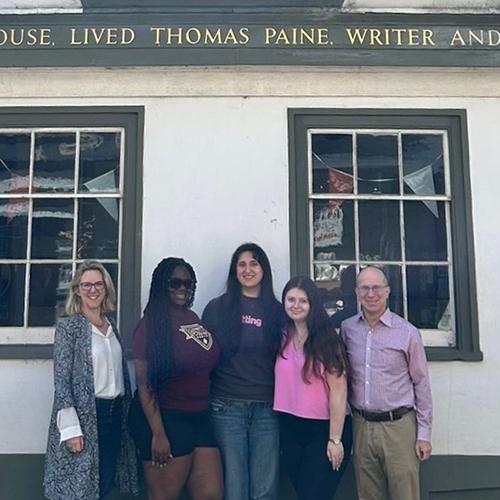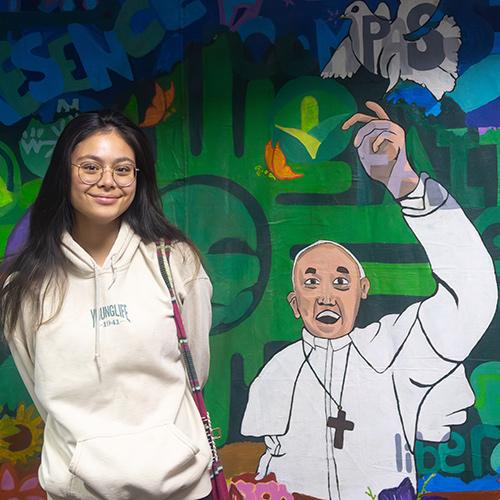Service-Learning
Apply what you've learned in the classroom as you help your community tackle real-life issues through experiential learning.
What is Service-Learning?
Service-learning is much more than community service. These for-credit courses have three main components: academic coursework, a project with a community partner, and reflection.
We want you to leave Iona ready to take on the world and to continue learning outside the lines — in your own life and career, but also on behalf of others. Service-learning courses show you how academic knowledge can be applied in unexpected ways. You'll also find there are some things you can only learn outside of the classroom. Service-learning is a way to practice experiential learning in your local community and beyond.
You might spend time with underprivileged children in Dominica, look at how community-based learning can draw attention to local health and wellness needs, or learn how to engage with environmental concerns at the Agape community in MA. As the world changes, our service-learning offerings grow and evolve to best serve our partners and our students.
Academic Content
Service-learning can be incorporated into courses at any level, from any academic discipline — from “Religion and the Natural World” to "Consulting Strategies & Ethics" to “Studying Educational Systems in the West Indies”.
Your service-learning instructor prepares content — readings, lectures, group activities, research assignments — to get you ready to collaborate with your designated community partners.
Fulfilling Community-Identified Needs
You’ll partner with nonprofit organizations, government agencies and social service groups on specific projects serving needs identified by the organizations and the communities they serve.
Our relationships with community partners are designed to be reciprocal, not one-sided. You're not just helping an organization in need, you're gaining valuable experience. They're not just getting volunteer assistance, they're putting effort into learning with you and sharing their expertise.
Intentional Reflection
Reflection is the key third piece of service-learning that helps bring it all together. We’ll ask you to think meaningfully about your experience — through writing, discussion, presentations, even artistic expressions. These reflections reinforce what you've learned and help you develop a deeper understanding of complex social issues.
Learn More About Service-Learning
Benefits of Service-Learning
Students who participate in service-learning not only receive the benefits of helping a community in need but also are able to carry their experiences into the classroom and careers.
- Service-Learning courses on a transcript or résumé are attractive to potential employers.
- Service-Learning courses help students move from providing volunteer services for others to becoming advocates for real change in society.
- Service-Learning courses help students build a genuine bond with the communities they are serving.
- *Students who participate in high quality service-learning have the opportunity to see and act on the problems individuals and communities face, engage in dialogue and problem solving with the people most affected, and observe firsthand the effects of racism, sexism, poverty, and oppression.
- When we engage students in reflection related to their experiences, they can see the relevance of course content to real-world issues, the interdisciplinary nature of problems and solutions, the complexity of the social fabric, and how they can choose to become part of the solution rather than part of the problem.
- Service-Learning enables students to test out theories in real time, in real places, with real people, and with real consequences.
- Students can come to understand the difference between helping someone through direct service and becoming involved in public policy and political work that can foster change.
*Numbers 4-7 taken from p.11 - "Service Learning Essentials: Questions, Answers, and Lessons Learned" (Barbara Jacoby).
A Unique Service-Learning Opportunity:
The Catholic Worker
Fall 2025
The Catholic Worker was founded in 1933 by Dorothy Day in New York City. One of its guiding principles is hospitality towards those on the margins of society. Each Friday throughout the Fall 2025 semester, Iona students will join others in cooking meals at The Catholic Worker and then distributing them to those in need at Washington Square Park in Manhattan. This service-learning opportunity is sponsored by the Deignan Institute for Earth and Spirit and is coordinated by Dr. Jim Robinson. Students are also welcome to serve meals at The Catholic Worker on Wednesday between 10 a.m.-2 p.m. Please contact Dr. Robinson for details at jxrobinson@iona.edu.
Community Partners
Previous service-learning community partners include:
- New Rochelle Public Library
- Big Viv’s Toy Drive
- Boys & Girls Club of New Rochelle
- Songcatchers
- Don Bosco Feeds Program
- Meals-on-Wheels
- Sheldrake Environment Center
- Feeding Westchester
- Lincoln Park Community Garden
- The Catholic Worker
- Hope Community Services
- Volunteer New York!
Interested in becoming a community partner?
Information for Organizations


